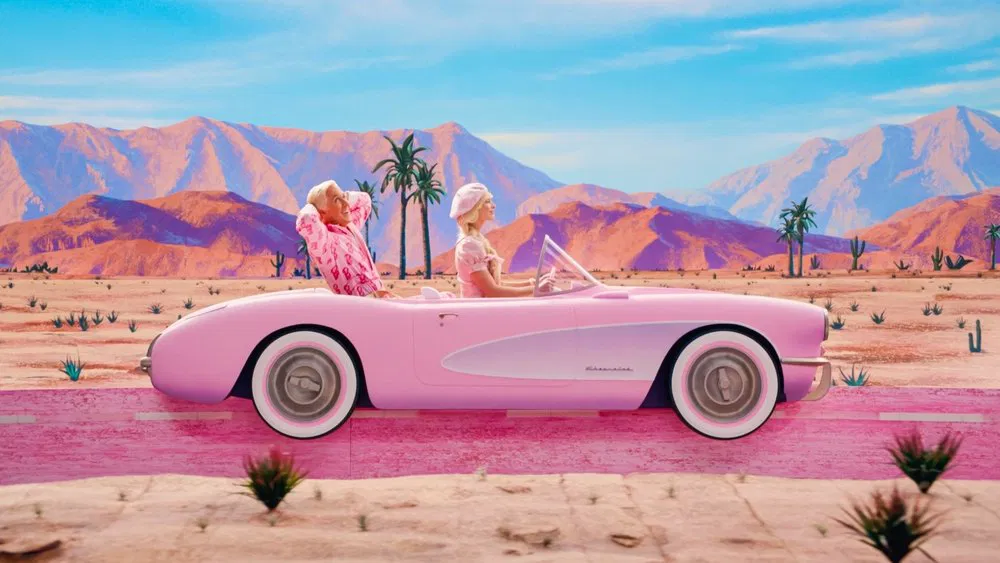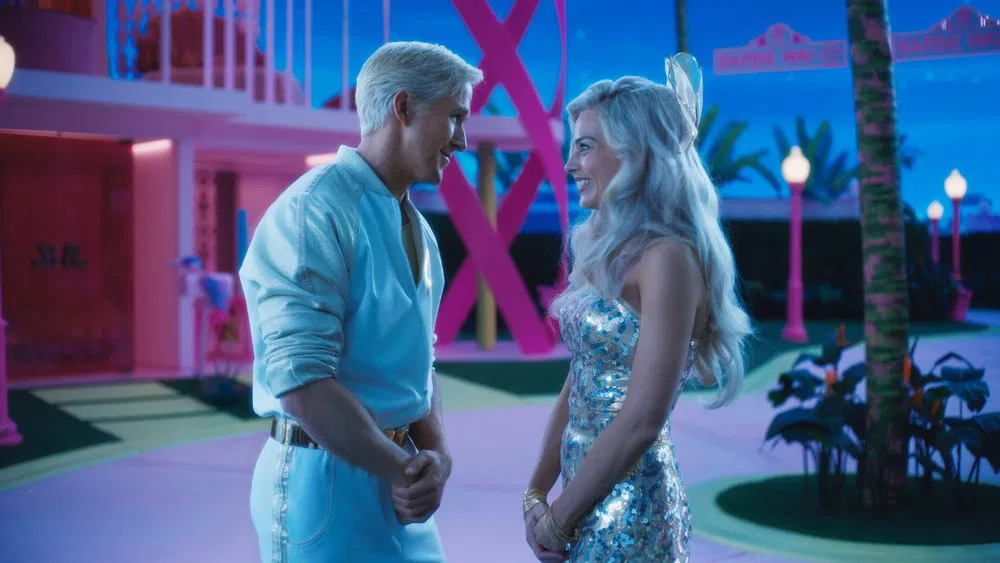All is peaceful in Barbieland. The city is ruled by Barbies, while the Kens catch waves on the beach and enjoy the wonderful plastic world. Every day is perfect: disco parties, dances, chic costumes, and no worries. But then one of the Barbies (Margot Robbie) begins to notice changes in herself: she thinks about death, cellulite appears on her flawless body, and the worst thing… her feet become flat. With the help of Weird Barbie (Kate McKinnon), who lives in the suburbs of Barbieland, Barbie learns that the reasons for her deteriorating condition must be sought in the real human world. To return to her former carefree state, Barbie needs to find the grown-up girl who played with her as a child. Since Ken (Ryan Gosling) cannot be separated from Barbie for a minute, he also goes to Los Angeles, where he learns about the patriarchal system, after which he wants to carry out reforms upon returning to Barbieland.

Mattel and Warner Bros. have been developing a Barbie movie since 2009. During this time, the project has seen a huge number of screenwriters and directors. The comedy with Amy Schumer went the furthest, but the project was shut down before production began. Looking back, it’s hard to imagine a more perfect candidate for the director’s chair than Greta Gerwig. The author of the films “Lady Bird” and “Little Women” cracked the code of mass feminist cinema and found access to the most vulnerable points of viewers, especially touching people who identify as women. Even in a large studio film, from which corporations try to shake out the last remnants of humanity, bringing the product to a sterile state, Gerwig managed to preserve a piece of the imperfect human soul. “Barbie” became a small victory for independent directors in big cinema, managing to maintain a balance between studio censorship and ideas living in small indie films.

“Barbieland” is the complete opposite of the modern world. There, matriarchy reigns, and no one knows what aggression or depression is. When Barbie enters reality, she gets an existential microstroke and sheds tears for the first time. Ken, on the other hand, is inspired, seeing in the patriarchal system a chance to escape from Barbie’s shadow. Bringing masculine ideas to Barbieland, Ken plunges the perfect plastic world into chaos. In the line of confrontation between the Kens and Barbies, Greta literally explains on dolls how the imbalance of power in one direction or another harms society. Unfortunately, even such a detailed explanation of a simple idea is not within everyone’s reach, judging by the reaction to the protection of Ken’s rights online. The most comical thing about the situation is that the same people who are offended by Ken’s position in Barbieland write threads criticizing Margot Robbie’s appearance, thereby reinforcing the conclusions made by Gerwig in the film.
Fortunately, the film does not skimp on meta-irony, and the characters make comical remarks that Barbie (Margot) is not good enough to be a real “Barbie,” putting an end to a series of useless internet disputes. Gerwig uses the directness and extravagance of camp aesthetics, which undoubtedly fits into the atmosphere of the bright world of “Barbie,” for a feminist manifesto with musical numbers and shiny costumes. As in her previous directorial works, Greta literally infects the viewer with love for women, reminding both Barbies and Kens, and those in between, that being yourself, despite all external circumstances, is good enough. Or just enough (look for people in I’m Kenough hoodies in your area).

The production designer Sarah Greenwood did a titanic job, creating a meticulously detailed world of Barbie, triggering memories of anyone who held a doll in their hands as a child. Gerwig follows authenticity: from Robbie’s curved feet to the angular movements of the actors, all 15 opening minutes of the film plunge into the abyss of forgotten sensations of playing with Barbie. The plastic world comes to life on the screen, resonating with the viewer in memories, fulfilling the childhood dream for many.
Margot Robbie, contrary to the grumbling of internet critics, turned out to be the best Barbie one could wish for: her sensitive performance and atomic comedic potential sweep everything in their path. Gosling broadcasts furious Kenergy, as a supporting character, the actor had room to roam and even in some scenes pull the blanket over himself. Rumors about a possible Oscar nomination are highly likely to come true, only Daniel Day-Lewis could surpass Ryan this year, but he has retired, so the horizon is clear.
“Barbie” is a two-hour monologue about what it’s like to feel like a woman in a patriarchal world, interrupted by commercials from Mattel. A campy, inclusive, and touching film, which, thanks to a large-scale marketing strategy, gave viewers the opportunity to have a holiday: dress in pink and have a good time. At the same time, “Barbie” managed to withstand the hype and meet the inflated audience expectations. We laughed, cried, returned to the real patriarchal world, but at least with warmth in our hearts and Ken’s song in our heads.